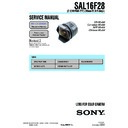Sony SAL16F28 Service Manual ▷ View online
4-9
SAL16F28 (2.8/16 FISH-EYE) (16mm F2.8 Fisheye)
4-3.
FLANGE BACK (f’F) CHECK/ADJUSTMENT
4-3-1. Flange Back (f’F) Check
Equipment
• 1000 mm Collimator
• Flange Back Tester
• A-mount Attachment
• Flange Back Gauge (43.50mm)
1. Preparations
1)
Set the equipments as shown in the Fig.4-3-1.
Fig.4-3-1
2)
Looking through the eyepiece lens, turn the eyepiece ring of the flange back tester so that cross line or scale in the view is the sharpest.
3)
Attach the flange back gauge (43.50mm) securely to the A-mount attachment and hold them together.
4)
Turn the focusing knob of the flange back tester so that fine scratches on the flange back gauge (43.50mm) is the sharpest.
Note:
Turn the knob in the direction of the arrow of Fig.4-3-2 for correct reading.
Fig.4-3-2
5)
Turn the scale ring of the dial gauge until the long pointer indicates “0”.
Note:
This position is the flange back (f’F) = 43.5 mm.
Memorize the position of short-pointer.
flange back gauge (43.50mm)
A-mount attachment
Objective lens (10x)
Dial Gauge (Min. scale: 0.01 mm)
Scale ring
Eyepiece lens (7x)
Eyepiece ring
Focusing knob
Focus on fine lines on the surface.
Always turn the knob in the arrow
direction for correct reading.
direction for correct reading.
4-10
SAL16F28 (2.8/16 FISH-EYE) (16mm F2.8 Fisheye)
2. Checking Method
1)
Attach the checking lens to the flange back tester, and set the 1000 mm collimator.
Fig.4-3-3
2)
Set the focus ring of the checking lens to infinity end position while looking through the microscope, and align the optical axis to the
center of the chart image accurately.
3)
Turn the focusing knob of the tester until the chart image is the sharpest (red and green color areas are equal on the chart *).
*: Position in which the color of collimator chart changes from green into red and come into focus.
Also check the optical axis aligns with the chart center. (Refer to Fig.4-3-4.)
Note:
Figure shows example. The cause depends on individual lens.
Fig.4-3-4
4)
Calculate the flange back (f’F) of the checking lens using the following formula, and check that the specification of the Table 4-3-1 is
satisfied.
Flange back (f’F) of the checking lens = (Flange back gauge) + (Number of short-pointer revolution) + (Reading of long-pointer)
Specification
Focal-length
f’F (mm)
f (mm)
(Infinity position)
16
44.56 to 44.60
Table 4-3-1
5)
When the flange back (f’F) of the checking lens is out of specification of the Table 4-3-1, perform “4-3-2. Flange Back (f’F)
Adjustment”.
1000 mm collimator
Checking lens
Optical Alignment
Best alignment
Best alignment
Incorrect aligned
e.g. As the focusing knob is turned, the chart may appear blurry as illustrated.
The cause depends on individual lens.
e.g. As the focusing knob is turned, the chart may appear blurry as illustrated.
The cause depends on individual lens.
4-11
SAL16F28 (2.8/16 FISH-EYE) (16mm F2.8 Fisheye)
4-3-2. Flange Back (f’F) Adjustment
Equipment
• 1000 mm Collimator
• Flange Back Tester
• A-mount Attachment
• Flange Back Gauge (43.50mm)
• Adhesive bond (B-10)
Adjusting Method
1)
Disassemble or assemble the checking lens into the state of Fig.4-3-5.
Fig.4-3-5
2)
Perform “4-3-1. Flange Back (f’F) Check”, and check that the flange Back (f’F) of the checking lens is out of specification of the Table 4-3-1.
3)
Turn the focusing knob of the tester until the flange back (f’F) of the checking lens is “44.58 mm”.
Note:
When turning the focusing knob of the tester, chart image check is not required.
4)
Turn the focusing ring of the checking lens until red and green color areas are equal on the chart while looking through the micro-
scope.
Note:
If in-focus point cannot be obtained even through the focus ring is fully turned, perform the following steps (1) to (4) and
shift the position of the focus stop plate. (Refer to Fig.4-3-6.)
(1) Set the focusing ring to the infinity stop position, and hold the focus ring.
(2) Loosen the three screws fixing the focus stop plate.
(3) Turn the helicoid in the direction of the arrow (screw in direction), and tighten the three screws loosened in step (2) tentatively.
(4) Perform the step 4) again.
5)
Loosen the three screws fixing the focus stop plate, contact the focus stop plate to focus ring and tighten the three screws.
6)
Apply the adhesive bond (B-10) to head of three screws shown in figure.
Fig.4-3-6
7)
Check that the focus ring moves smoothly from minimum distance to infinity, and perform “4-3-1. Flange Back (f’F) Check” again.
8)
After the adjustment is completed, affix the focus scale plate. (Refer to HELP04)
1.5
0.5
0.3
0.8
0.7
0.25
0.2
∞
Focus stop Plate
Apply the adhesive bond(B-10)(3 areas)
∞
1.5
0.5
0.3
0.8
0.7
0.25
0.2
Focus Scale Plate
4-12
SAL16F28 (2.8/16 FISH-EYE) (16mm F2.8 Fisheye)
4-4.
LENS ROM CHECK
Note:
If dialog box of error code appears during the checking, check the reason of error referring to page 4-13.
Equipment
• Personal Computer (PC)
• Camera DSLR-A100
• USB Cord With Connector
• Lens Adjustment Program
Note:
Lens Adjustment Program is downloadable from the ESI homepage.
1. Preparations
1)
Connect the checking lens to the camera.
2)
Start the lens adjustment program “LensAdjustment.exe” referring to “4-1-2. Lens Adjustment Program”.
Fig. 4-4-1
2. Checking Method
1)
Click the
[Connect]
button on the lens adjustment program.
Note:
Click the
[End]
button to disconnect the USB connection, then lens adjustment program will terminate.
2)
Check that the display of “Lens Code” and “Model Name” is correct.
Note:
Focus position setting is not required.
Fig. 4-4-2
3)
Click the
[End]
button to terminate the lens adjustment program.
4)
Turn the POWER switch of the camera to OFF.
Click on the first or last page to see other SAL16F28 service manuals if exist.

